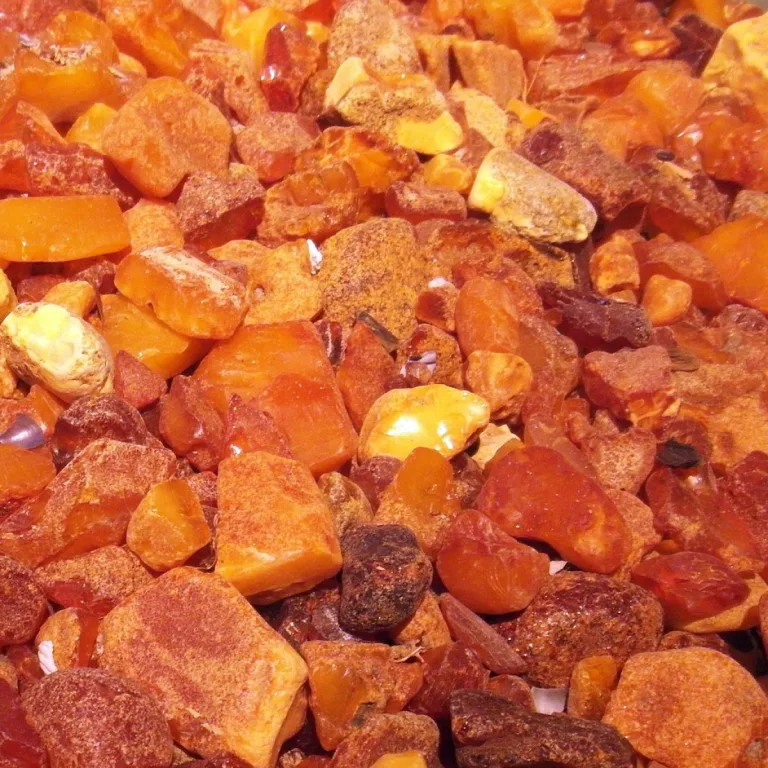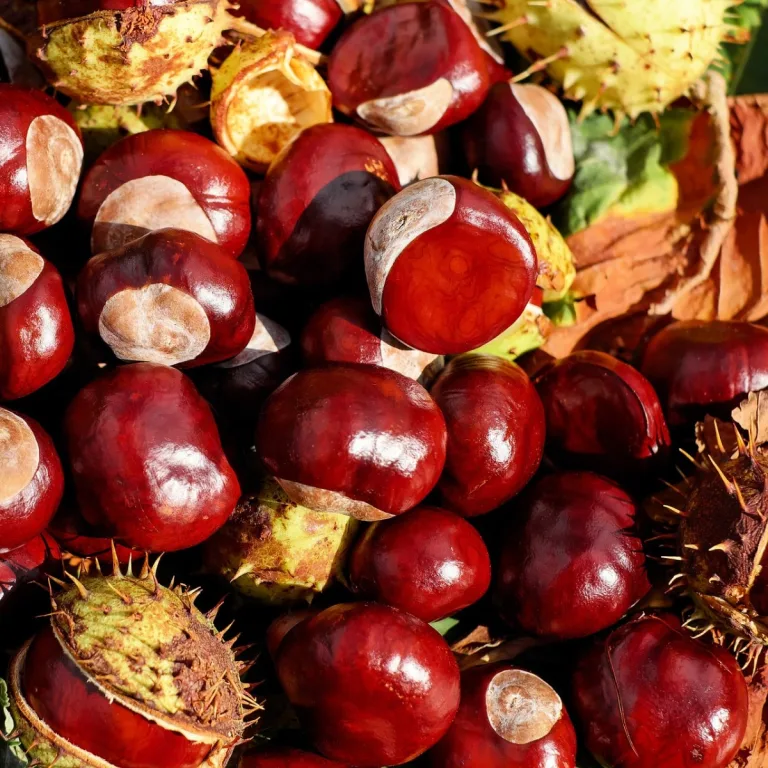Inflammatory bowel disease (IBD) is an umbrella term that represents two autoimmune conditions (ulcerative colitis and Crohn’s disease) that cause inflammation in the lining of the intestinal wall. Each type of IBD affects a different part of the gastrointestinal (GI) tract.
- Crohn’s disease can influence any part of the gastrointestinal (GI) tract, from the mouth to the anus. This chronic disease causes inflammation of the digestive tract, which can involve different areas of the digestive tract in different people, and lead to malnutrition, abdominal pain, fatigue, severe diarrhea, and weight loss. Crohn’s disease can be weakening as well as painful, and it may sometimes lead to life-threatening complications.
- Ulcerative colitis. This disorder affects only the lining of the large intestine (colon) and rectum.
Crohn’s disease affects mostly individuals in western Europe and North America, where it has a prevalence of 100 to 300 per 100,000 people. Ulcerative colitis prevalence is 9 to 20 cases per 100,000 persons per year. Compared to Crohn disease, ulcerative colitis has a greater incidence rate in adults. Ulcerative colitis can be debilitating and can sometimes cause life-threatening complications.
Although there’s no known cure for inflammatory bowel disease, some therapies and medications can significantly lessen its signs and symptoms and even bring healing of inflammation and long-term remission. You may also find relief from the right diet and nutrition (1, 3, 24, 29, 30).
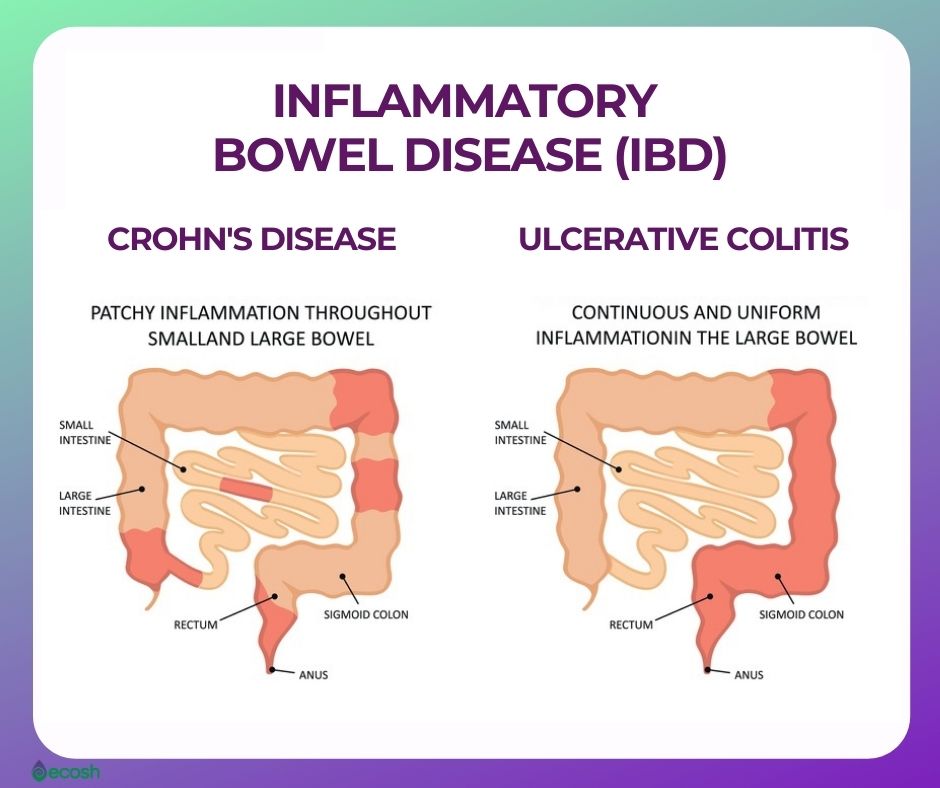
Inflammatory Bowel Disease Symptoms and Signs
Symptoms and signs of inflammatory bowel disease can vary from mild to severe, and usually develop gradually. However, sometimes symptoms may come on suddenly, without warning. You may experience periods of time when you have no signs or symptoms (remission), or times when symptoms suddenly reactivate (flare-ups).
Although symptoms range from person to person, there are some common symptoms of inflammation of the GI tract caused by Crohn’s disease or ulcerative colitis. See your doctor if you have any symptoms of inflammatory bowel disease or persistent changes in your bowel habits (1).
Inflammatory bowel disease signs and symptoms may include:
In case Crohn’s disease:
- Persistent diarrhea
- Urgent need to move bowels
- Sensation of incomplete bowel evacuation
- Fever
- Fatigue
- Abdominal pain and cramps
- Rectal bleeding
- Blood in your stool
- Mouth sores
- Reduced appetite
- Unexplained weight loss
- Drainage or pain around or near the anus because of inflammation from a tunnel into the skin (fistula)
- Constipation, which can lead to bowel obstruction
- In case of severe Crohn’s disease, people may also experience symptoms such as iron deficiency (anemia); inflammation of eyes, skin and joints; inflammation of the liver or bile ducts; kidney stones; in children, delayed growth or sexual development (1, 2).
In case ulcerative colitis:
- Recurring diarrhea, often with blood, mucus or pus
- Diarrhea that awakens you from sleep
- Tummy pain and cramping
- Rectal pain
- Rectal bleeding
- Needing to empty your bowels frequently
- Inability to defecate despite urgency
- Loss of appetite
- Weight loss
- Tiredness and fatigue
- Fever
- In children, failure to grow
- During a flare-up, and in severe cases, some individuals with ulcerative colitis may also have symptoms elsewhere in their body. For example, some people may experience areas of painful, swollen and red skin; swollen and painful joints (arthritis); mouth ulcers; red and irritated eyes; having to empty your bowels 6 or more times a day (in severe cases); shortness of breath; a fast or irregular heartbeat; fever; in addition, blood in your stools becomes more obvious (24, 25).
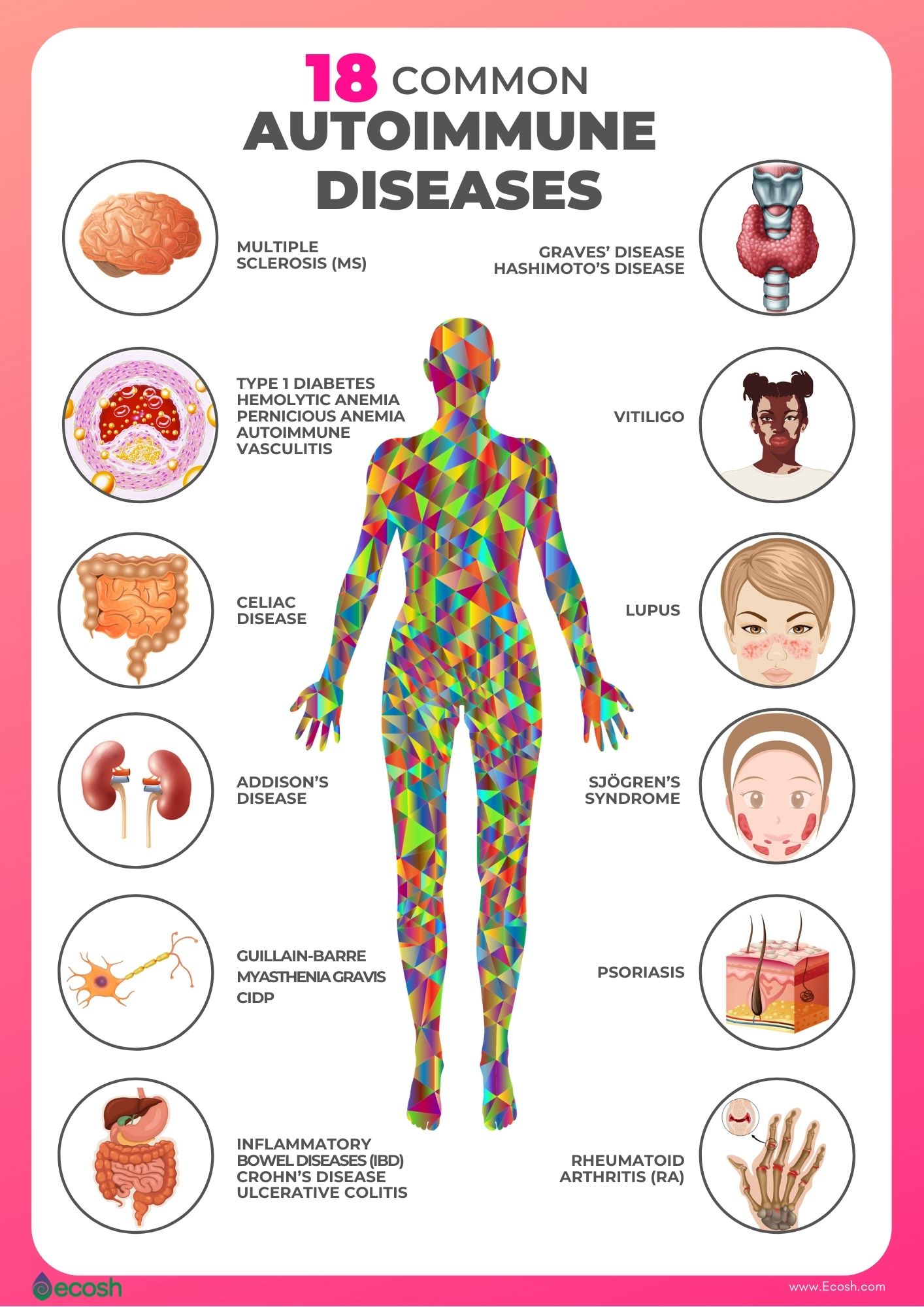
Inflammatory Bowel Disease Causes
The immune system normally guards against germs like bacteria, viruses, fungi, and other microorganisms. When it detects these alien invaders, it sends out an army of fighter cells to attack them.
Normally, the immune system can tell the difference between foreign cells and your own cells, and during a normal immune response, cells travel out of the blood to the intestines and produce inflammation. Under normal circumstances, harmless bacteria that’s present in the gastrointestinal tract are protected from an immune system attack.
However, in an autoimmune disease like inflammatory bowel disease, the harmless bacteria are mistaken for foreign invaders, and an abnormal immune response causes the immune system to attack the cells in the digestive tract, too.
The immune response causes the inflammation which does not go away. This leads to chronic inflammation, ulceration, thickening of the intestinal wall, and, eventually, symptoms of Crohn’s disease or ulcerative colitis.
The precise causes of inflammatory bowel disease are not yet well understood. Earlier, doctors suspected that diet and stress were the culprits, however now it`s thought that these factors may aggravate inflammatory bowel disease, but don’t cause it.
According to recent research, several factors, such as heredity, stress, genetics, environmental factors, and a malfunctioning immune system may contribute to its development. Also, although scientists have not proved it yet, it’s possible that bacterium or a virus may be the trigger of inflammatory bowel disease (1, 2).
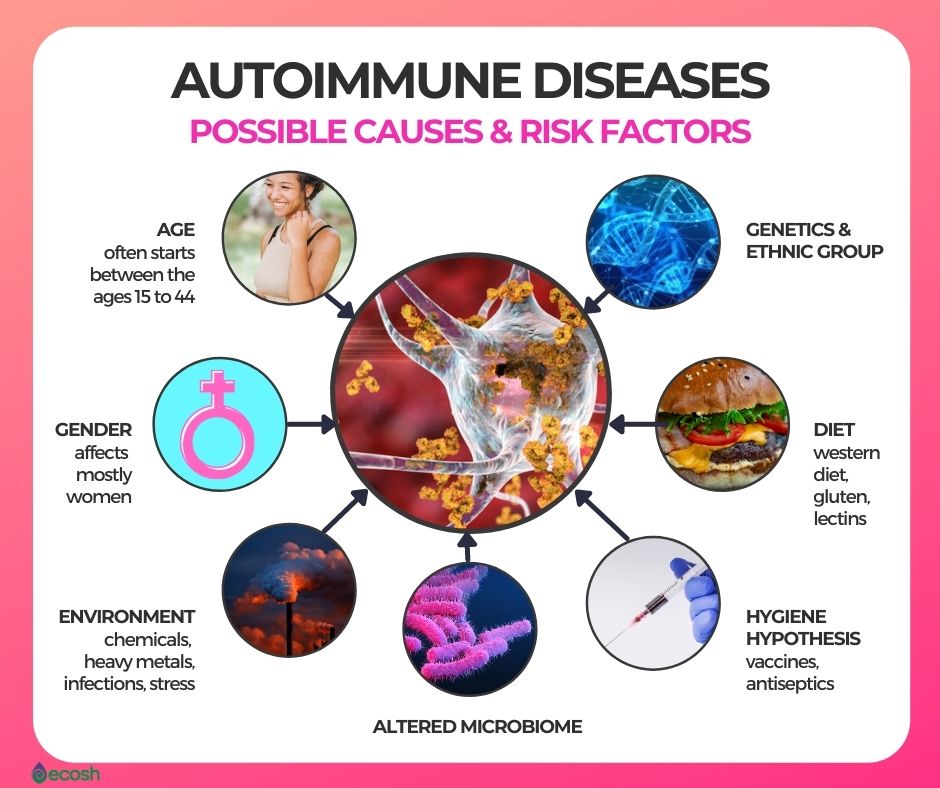
Inflammatory Bowel Disease Risk factors and Risk Groups
Risk factors and risk groups for inflammatory bowel disease may include:
Age. Although this condition can occur at any age, it generally begins between the ages of 15 and 35. However, some individuals may not develop the disease until after age 60.
Gender. Inflammatory bowel disease affects about the same number of women and men.
Ethnicity. Inflammatory bowel disease may affect any ethnic group, however the condition is more common among white people, particularly people of Eastern European backgrounds, including Jews of European descent (Ashkenazi). The greatest prevalence of inflammatory bowel diseases are seen in North America and Northern Europe. Though, there have been an increased number of cases reported in African-American populations who live in North America and the United Kingdom in recent years. Therefore, it seems that inflammatory bowel diseases such as ulcerative colitis and Crohn’s disease are closely linked to a westernized environment and lifestyle.
Geography and environment. Crohn’s disease is more common:
- Northern climates, rather than southern climates
- In developed countries, rather than undeveloped countries
- Urban cities and towns, rather than rural areas
Genetics and heredity. As Crohn’s disease tends to run in families, you’re at higher risk of developing the disease if you have a first-degree relative with this condition. According to studies, between 5% and 20% of people with irritable bowel syndrome (IBD) have a family member, such as a parent, child, or sibling, who also has one of the diseases. The genetic risk is higher with Crohn’s disease than ulcerative colitis. However, most inflammatory bowel disease patients don’t have family members with the disease.
Cigarette smoking. Research suggests that women who smoke are at higher risk to develop Crohn’s disease, and need surgery, than men who smoke.
Nonsteroidal anti-inflammatory medications. Although some medications such as for example naproxen sodium (Aleve), ibuprofen (Advil, Motrin IB, others), diclofenac sodium and others, are not the causes of Crohn’s disease, they can make Crohn’s disease worse, as they may lead to inflammation of the bowel (1, 2, 4, 24, 29).
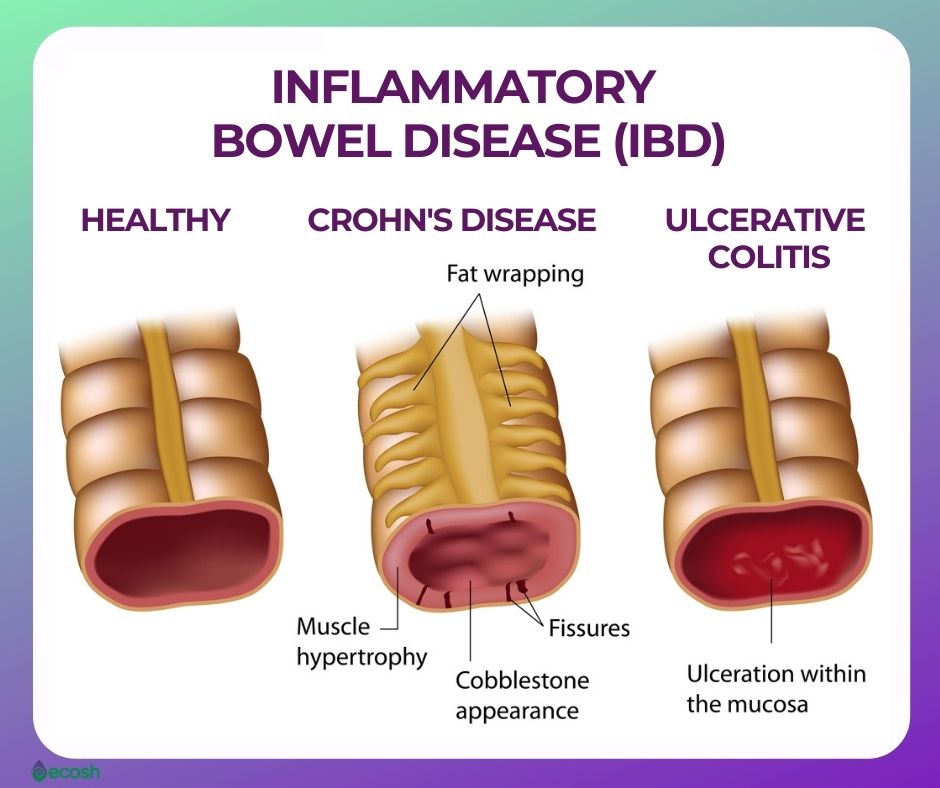
Inflammatory Bowel Disease Complications
Inflammatory bowel disease may cause one or more serious complications.
Crohn’s disease complications may include:
Malnutrition. Often people with Crohn’s disease develop anemia due to low vitamin B-12 or iron. It’s because abdominal pain, cramping and diarrhea may make it hard to eat or for your intestine to absorb the necessary amount of nutrients to keep you nourished.
Bowel obstruction. Some parts of the bowel can scar and narrow, which may block the flow of digestive contents. Therefore, over time, Crohn’s disease can influence the whole thickness of the intestinal wall. People with Crohn’s disease may need surgery to remove the diseased part of the bowel.
Ulcers. Chronic and lasting inflammation due to Crohn’s disease may cause ulcers (open sores) everywhere in the digestive tract, including in the genital area (perineum), anus and mouth.
Fistulas. Occasionally ulcers can extend entirely through the intestinal wall, and create an unnatural connection between different body parts – a fistula. Fistulas may evolve between your skin and intestine, or between another organ and your intestine. The most common kind of fistulas are Fistulas near or around the anal area (perianal). In case fistulas form in the abdomen, food may bypass areas of the bowel that are necessary for absorption. Fistulas may develop in the bladder or vagina, between loops of bowel, or through the skin, causing constant drainage of bowel contents to your skin. Sometimes, a fistula may become infected and form an abscess, which can be life-threatening without treatment.
Anal fissure. Anal fissure is a small rip in the tissue that lines the anus or in the skin around the anus where infections can happen. It’s frequently linked with painful bowel movements and may lead to a perianal fistula.
Blood clots. This disorder increases the likelihood of developing blood clots in arteries and veins.
Colon cancer. Crohn’s disease that influences your colon increases your likelihood of developing colon cancer.
Other health problems. Crohn’s disease may also lead to other conditions, such as for example anemia, gallbladder or liver disease, osteoporosis, skin disorders, and arthritis.
Medicine risks:
- Some Crohn’s disease medications that act by blocking work of the immune system are linked with increased risk of infection, as well as a small likelihood of developing certain cancers like skin cancers and lymphoma.
- Corticosteroids may be linked with a risk of glaucoma, osteoporosis, bone fractures, cataracts, high blood pressure, and diabetes (1).
Ulcerative colitis complications may include:
- Osteoporosis (bone loss)
- Severe bleeding
- Perforated colon (a hole in the colon)
- Extreme dehydration
- Inflammation of your eyes, joints and skin
- An increased risk of colon cancer
- Toxic megacolon (a rapidly swelling colon)
- In addition, increased risk of blood clots in arteries and veins (24).
Inflammatory Bowel Disease Diagnosis
To diagnose some type of inflammatory bowel disease such as Crohn’s disease or ulcerative colitis, you may have one or more of the following tests and procedures:
Lab tests
- Blood tests
- Stool studies
Procedures

Inflammatory Bowel Disease Treatment – Conventional Medicine, Herbal Remedies, Inflammatory Bowel Disease Diet and Supplements for Inflammatory Bowel Disease
Conventional Medicine
Today, there is no cure for IBD. Also, there is no one treatment that is effective for everyone. The main goal of treatment is to lessen the inflammation which triggers the signs and symptoms, and improve long-term prognosis by limiting complications. This may lead to symptom relief as well as to long-term remission. However, you’ll need to weigh the benefits and risks of any treatment, as some medications may have serious side effects (1, 24, 34).
Anti-inflammatory drugs. These medications are frequently the first step in the treatment of IBD (inflammatory bowel disease). Anti-inflammatory drugs include:
- Corticosteroids. Corticosteroids can help lessen inflammation in your body. However, these medicines don’t work for all people with IBD. Doctors may use corticosteroids only if you don’t respond to other treatments, or also in combination with an immune system suppressors.
- Oral 5-aminosalicylates. These drugs have been widely used in the past but now are generally considered of very limited benefit (1, 24).
- Immune system suppressors. These medications also lessen inflammation, but they do so by suppressing the immune system response which produces the substances that cause inflammation. For some patients, a mixture of these medicines may work better than one drug alone. However these medications may have side effects, so you will need to be followed closely for side effects. Immune system suppressors include:
- Azathioprine. Side effects include lowered resistance to infection, inflammation of the liver, nausea and vomiting.
- Methotrexate
- Cyclosporine
- Tofacitinib (1, 24).
Biologics. Biologics, which target proteins made by the immune system, and are used to treat Crohn’s disease or ulcerative colitis include:
Antibiotics. These may lessen the amount of drainage from fistulas and abscesses, and sometimes heal them in people with Crohn’s disease. According to some researchers antibiotics may also help reduce bad intestinal bacteria that may play a role in triggering the intestinal immune system, and cause inflammation. Antibiotics prescribed for Crohn’s may include:
- Ciprofloxacin
- Metronidazole (1).
Other medications. Certain other medications may also help control inflammation, and relieve your signs and symptoms. However, always consult your doctor before taking any over-the-counter drugs. Other medications include:
- Anti-diarrheal medications. For example fiber supplements, such as psyllium powder or methylcellulose, may help alleviate mild to moderate diarrhea by adding bulk to your stool. For more severe diarrhea, loperamide may be effective.
- Pain relievers.
- Pain relievers (acetaminophen, but not ibuprofen, naproxen sodium, and diclofenac sodium, as these can worsen symptoms and increase the severity of disease)
- Antispasmodics (antispasmodic therapies) (1, 24).
Vitamins and supplements. If your body does not absorb enough nutrients, and you are suffering from nutrient deficiency, your doctor may suggest vitamins and nutritional supplements (1). See the list of most often recommended nutrients and vitamins in inflammatory bowel disease below.
Nutrition therapy. To allow the bowel to rest (in the short term, bowel rest may also lessen inflammation), and to improve your overall nutrition, your doctor may suggest:
- Enteral nutrition. A special diet given by mouth or a feeding tube
- Parenteral nutrition. Nutrients infused into a vein.
- A low-fiber or low residue diet to lessen the likelihood of intestinal blockage if you have a narrowed bowel (stricture). A low residue diet is designed to reduce the size and number of your stools (1).
Surgery. If drug therapy, lifestyle changes, diet or other treatments don’t relieve your symptoms, your doctor may suggest surgery. However, the benefits of surgery for Crohn’s disease are usually temporary, and surgery does not cure Crohn’s disease. In case ulcerative colitis, surgery involves removing your entire colon and rectum (proctocolectomy), and can eliminate ulcerative colitis (1, 24).
Cancer surveillance. As ulcerative colitis patients have increased risk of colon cancer, you will need more-frequent colon cancer screening. However, individuals with proctitis should not worry, as they don`t have increased risk of colon cancer (24).
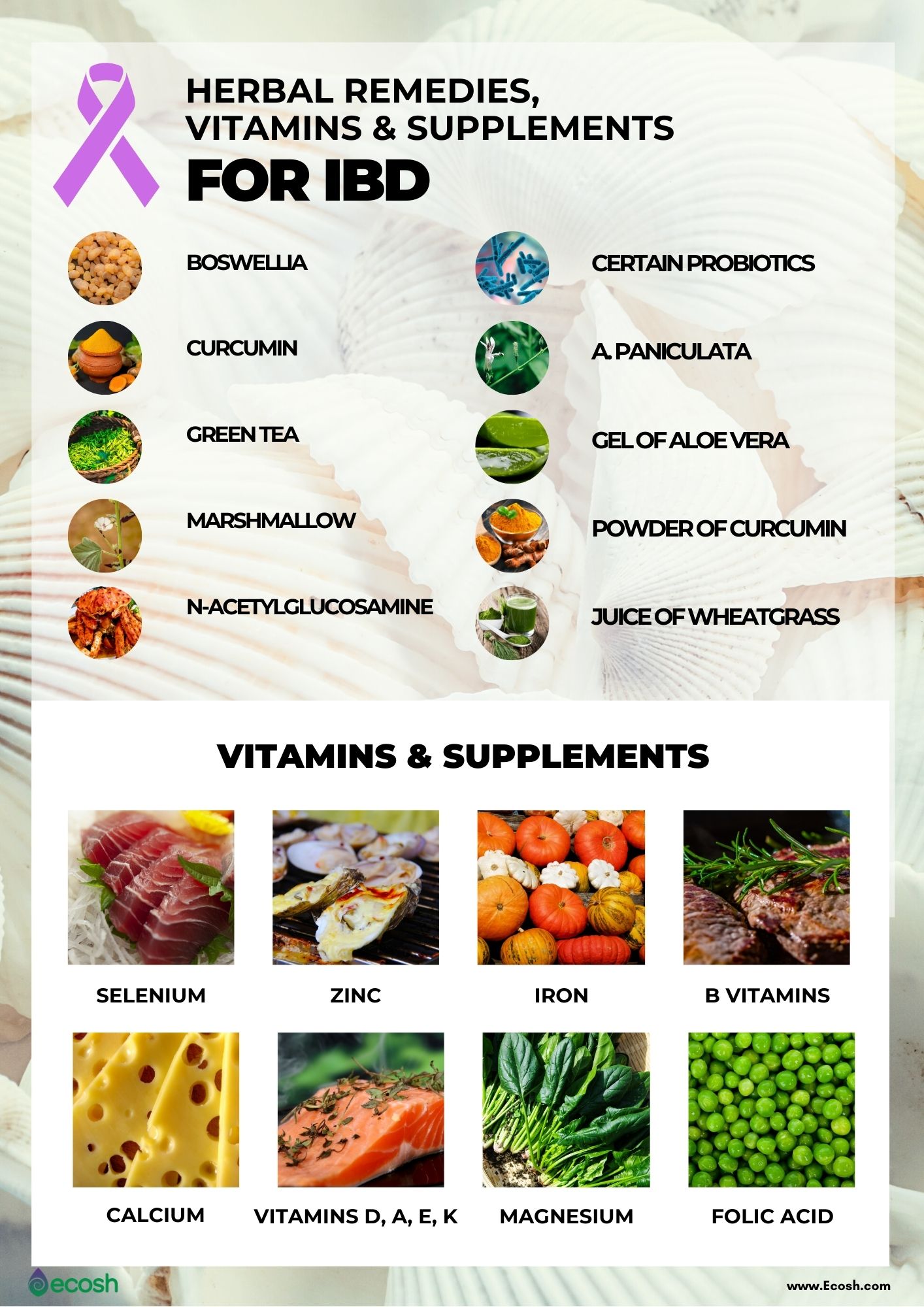
Herbal Remedies and Alternative Medicine for Inflammatory Bowel Disease
For individuals with inflammatory bowel disease, the goal is to achieve and maintain remission as long as possible. While there are several prescription medications that can help you manage and relieve the symptoms, some people prefer to try alternative medicine.
Herbal Remedies for Crohn’s Disease
1. Boswellia
It’s believed that Boswellia serrata may act as an anti-inflammatory agent. According to a study, 14 out of 20 people with Crohn’s disease who took boswellia supplements achieved remission. Boswellia is sometimes used also for the treatment of inflammation, asthma, and depression. Boswellia supplements are derived from trees that produce a sweet-smelling resin (acid in the resin is the active ingredient) rich in carbohydrates, essential oils, and boswellic acids (5, 6).
2. Curcumin in Turmeric
Extensive studies in the last two decades suggested that curcumin, the active compound in turmeric possesses anti-inflammatory, anticancer, antiviral, anti-amyloid, antiarthritic and antioxidant properties. This may help fight infections in people with Crohn’s. However, one major challenge in using turmeric to treat Crohn’s is delivering a high enough dose. This is because people with Crohn’s have trouble absorbing turmeric during digestion.
Currently, researchers are developing different ways to deliver turmeric into the body for maximum absorption. Additionally, the health risks of consuming turmeric must be considered for each person. The compound may worsen gallbladder illnesses, interact with blood-thinning medications and interfere with iron absorption. When curcumin is in the body, it may also act similarly to hormones. You should speak to your doctor before taking this supplement if you have a condition that’s sensitive to hormones (6, 16).
3. Green Tea
Green tea polyphenols are involved in inflammatory processes and seriousness of symptoms that burden inflammatory bowel disease (IBD) patients. According to an animal study, green tea polyphenols might possess anti-inflammatory properties and lessen colon inflammation. However, it might not have the exact same effects on people, but there are no risks in consuming it (5, 7, 15).
4. Marshmallow
According to research, a herb called marshmallow (comes from the Althaea officinalis plant) may soothe tissues during healing, particularly in the stomach which may also lessen inflammation in people with Crohn’s. In addition, the root guards the lining of the stomach, and might thereby reduce stomach acids with no apparent side effects on the body (5, 8).
5. N-Acetylglucosamine (also known as N–acetyl glucosamine)
In some tests, N-acetylglucosamine supplements (most often derived from the outer shell of crustaceans) have been associated to be effective in treating autoimmune disorders, as the supplement may stop cells that produce inflammation. Although further studies are needed to confirm these results, according to one study N-acetylglucosamine supplements lessened colon inflammation in children with Crohn’s disease with no negative side effects (5, 9).
Herbal Remedies for Ulcerative Colitis
According to a 2019 review several natural herbs may reduce ulcerative colitis symptoms and significantly increase the remission. However, there are few well-designed studies about this topic just yet, and the authors of this review do not recommend any of these substances as a standalone treatment. These herbs include:
- The extract of A. paniculata
- Gel of Aloe vera
- Powder of curcumin
- In addition, juice of wheatgrass (T. aestivum) (32, 33).
Read more about lifestyle tips and alternative medicine for ulcerative colitis here.
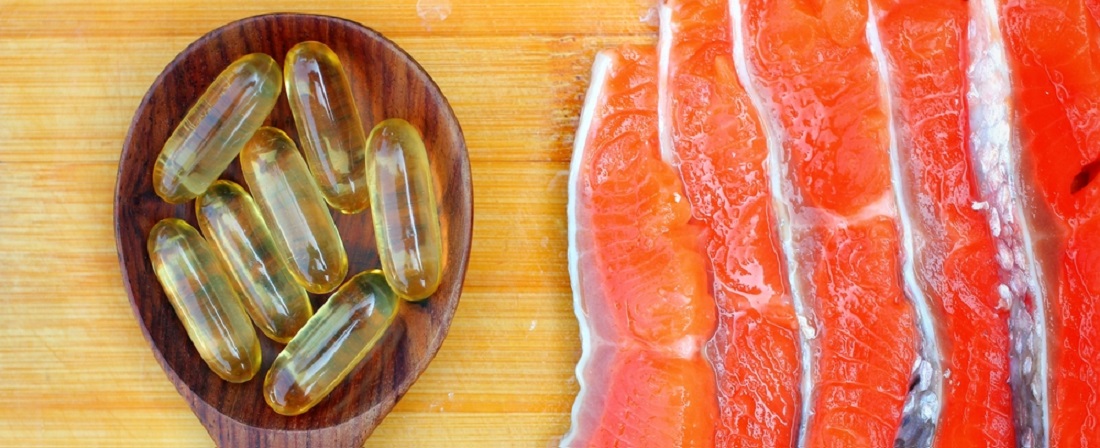
Nutrients and Supplements for Inflammatory Bowel Disease
Inflamed or damaged gut, severe symptoms, flare-ups, surgeries, and other complications may make it difficult for some individuals with ulcerative colitis or Crohn’s disease to absorb vitamins, minerals, carbohydrates, fats, and water. In other words, for them it’s hard to get enough nutrients from food alone. Also, the damage to the intestines may lead to blood loss over time. This in turn could lower iron levels and cause anemia.
Therefore, your doctor may suggest you to take some supplements. However, always consult your doctor before starting to take any dietary supplements, as while they can help you be better nourished, some can affect the way your IBD medications work or make your symptoms worse. Common supplements recommended for IBD patients include:
Inflammatory bowel disease (IBD) patients commonly have lower levels of nutrients such as:
1. Vitamin D
Vitamin D is necessary for maintaining normal levels of calcium and phosphorus in the blood, which strengthen bones and prevents osteoporosis. However, according to research, almost 50% of people with IBD diseases such as Ulcerative colitis and Crohn’s disease have lower vitamin D concentrations compared with healthy people. Even more, according to a study, lower levels of vitamin D in the blood may increase the risk of clinical relapse in patients with ulcerative colitis. Therefore, adding vitamin D into the diet may help reduce symptoms and increase immune system health in people with Crohn’s (5, 13, 14, 17, 28, 31).
2. Vitamin B-12
This vitamin is necessary for producing new cells, protecting nerve cells, helping to make red blood cells, breaking down proteins and fats in the body. However, people with inflammatory bowel disease often suffer not only from vitamin B-12 deficiency, but also B-6, and B-1 deficiency (5, 11, 12, 13, 17, 28).
3. Iron
Iron deficiency (anemia) is a frequent complication in IBD patients. However, only people with ulcerative colitis or Crohn’s disease that are in remission (or those without symptoms and without inflammation of the intestine) can take oral iron supplements. If you have ulcerative colitis or Crohn’s disease that is not in remission, or you cannot tolerate oral iron, intravenous iron therapy is usually recommended (10, 13, 17, 24, 26, 27, 28).
4. Folic Acid
Certain inflammatory bowel disease medications, such as methotrexate and sulfasalazine, may interfere with the absorption of folic acid, and lower your body’s levels of this nutrient. Therefore, your doctor may suggest you to take a folate supplement (13, 17, 28).
5. Calcium
Intestinal inflammatory processes reduce the absorption of sodium, chloride and calcium, while they increase potassium secretion. Also, some inflammatory bowel disease (IBD) drugs (steroids) may weaken your bones. Moreover, if you cannot digest milk or milk products, you’re at even higher risk to develop calcium deficiency. Therefore, your doctor may recommend you to take calcium supplements to keep your bones healthy and prevent other problems like osteoporosis. However, for strong bones, and in order to absorb calcium, you also need vitamin D (13, 17, 19, 28).
6. Vitamins A, E, and K
If you had surgery on your intestines, it can make it hard for your body to absorb fats, which also lowers your levels of vitamins A, E and K. So you might need to take supplements or eat foods rich in these vitamins (13, 17, 28).
7. Zinc
Inflammatory bowel disease (IBD) patients with serum zinc deficiency are more likely to have adverse disease-specific outcomes. Your doctor may suggest a daily supplement to raise your levels (13, 17, 20, 28).
8. Magnesium
Magnesium is an essential trace mineral, which plays a key role as an immunomodulator in many pathways leading to homeostasis. Hypomagnesemia (disturbance caused when there is a low level of serum magnesium (less than 1.46 mg/dL)) is common in patients with Crohn’s disease and may be the cause of upregulation of pro-inflammatory factors leading to aggravating symptoms. Therefore, understanding the role of magnesium in maintaining a healthy immune response is important for effective treatment of patients with CD (13, 18, 22).
9. Selenium
In studies, people with Crohn’s disease have been reported to be selenium deficient compared with controls. In particular, patients who have undergone bowel resection surgery have a decreased ability to absorb nutrients, including selenium (13, 17, 21).
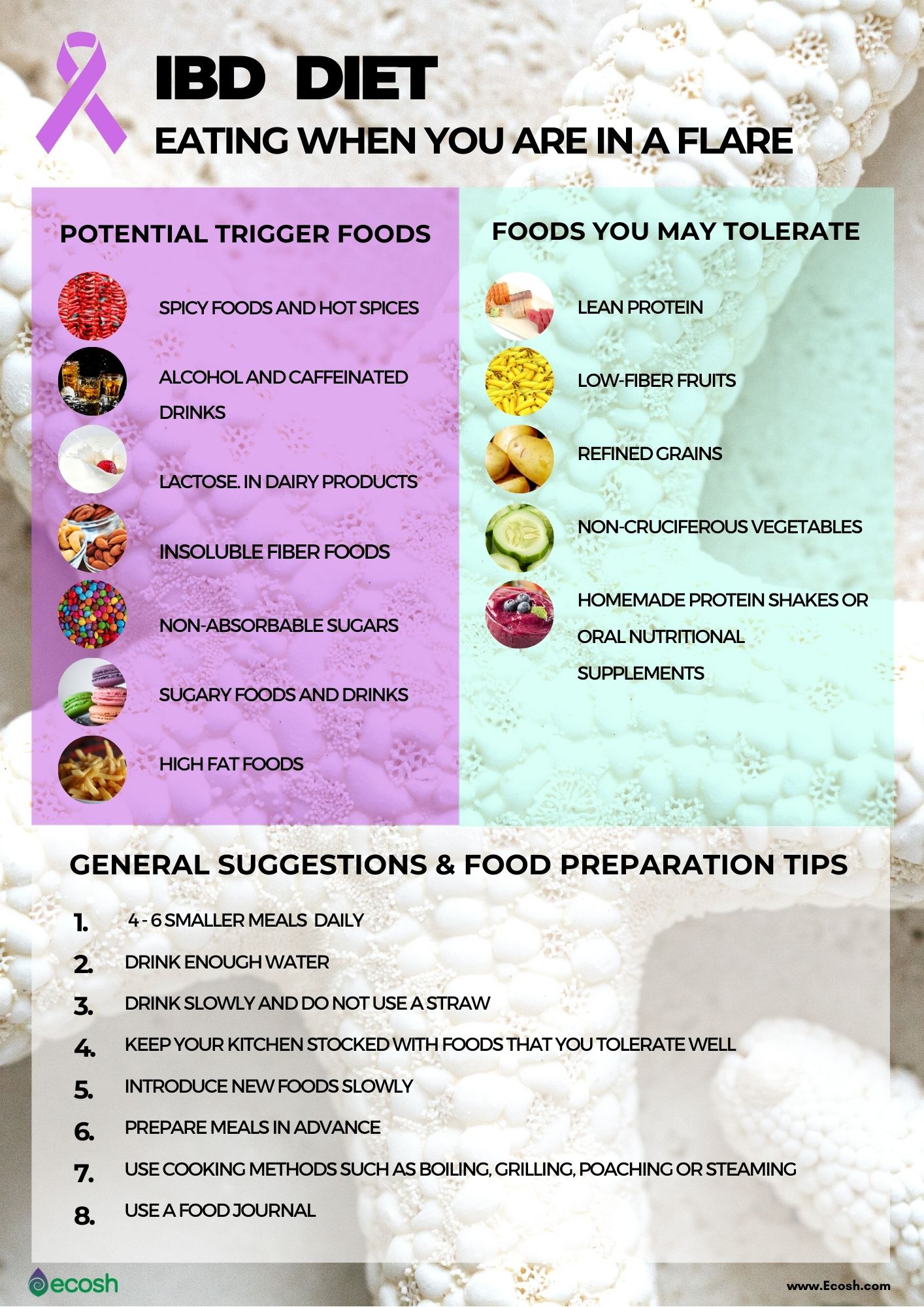
Inflammatory Bowel Disease (IBD) Diet
Although IBD may not be the consequence of bad reactions to certain foods, paying extra attention to your diet may help replace lost nutrients, lessen symptoms, and elevate healing. In addition, some soft, bland foods may cause less discomfort during flare ups than spicy foods, high-fiber foods, or or dairy (if you are found to be lactose-intolerant). However, consult with your dietitian or doctor before making any changes to your diet (23).
Meal Planning and Food Preparation Tips
Although there is no one suggestion that suits for all IBD patients, these tips may help lead you toward healthier daily nutrition:
- Consider eating 4 to 6 smaller meals daily.
- Drink enough. If your body is hydrated enough your urine should be light yellow to clear. Drink water, rehydration solution, broth, or tomato juice.
- Drink slowly and do not use a straw, as you may ingest air, which can cause gas.
- Keep your kitchen stocked with foods that you tolerate well (see list below).
- Introduce new foods slowly.
- Prepare meals in advance.
- Use healthy and simple cooking methods such as boiling, grilling, poaching or steaming.
- You can use a food journal that helps you keep track of what you eat and any symptoms that might occur due to food that you might not tolerate well (23).
Inflammatory Bowel Disease Diet – Eating When You are in a Flare
Certain foods may trigger bloating, cramping, and/or diarrhea, so you may want to avoid when you are in a flare. You should avoid trigger foods also if you have had a recent surgery, or have been diagnosed with a stricture, a narrowing of the intestine caused by inflammation or scar tissue.
Some other foods on the other hand can be easier to digest and these may provide you with the right amount of nutrients, vitamins, and minerals without making your symptoms worse. However consult your doctor or dietitian before starting any elimination diet.
Potential trigger foods for IBD patients include:
- Spicy foods and hot spices.
- Alcohol and caffeinated drinks. Soda, coffee and all beverages containing alcohol such as beer, wine, liquor, whiskey, and vodka.
- Lactose. Dairy products that contain lactose, such as milk, cream cheese, and soft cheeses.
- Insoluble fiber foods. Raw green vegetables (particularly cruciferous vegetables like cauliflower, broccoli, or everything with a peel), whole nuts, whole grains, and fruits with skin and seeds. These foods are hard to digest.
- Non-absorbable sugars. Mannitol, sorbitol, and other sugar alcohols found in candy, sugar-free gum, ice cream, and some types of fruits and juices like peach, pear, and prune.
- Sweet and sugary foods and drinks. Juices, candy, and pastries.
- High fat foods. Margarine, butter, coconut, cream, and other greasy, fatty, and fried food (23).
Foods IBD patients may tolerate include:
- Lean protein. Fish, lean meats such as lean cuts of pork, and white meat poultry, eggs, soy, and firm tofu
- Low-fiber fruits. Honeydew melon, bananas, cantaloupe, and cooked fruits. These are usually suggested for individuals who have had a recent surgery or have strictures.
- Refined grains. Potato, gluten-free bread, sourdough, white pasta, white rice, and oatmeal.
- Non-cruciferous vegetables. Asparagus tips, cucumbers, squash, and potatoes. These should be consumed fully cooked, skinless and seedless.
- Homemade protein shakes or oral nutritional supplements. See the list of recommended supplements above and consult your dietitian or doctor about what supplements may fit your nutritional needs (23).
Inflammatory Bowel Disease Diet – Eating When You are in Remission
It’s vital to maintain a nutrient-rich and diverse diet, as well as being hydrated even when your symptoms have subsided, or even disappeared (remission).
Foods that can help you stay healthy and hydrated:
- Protein. Fish, lean meats such as lean cuts of pork, and white meat poultry, eggs, soy, tofu and nuts.
- Fiber-rich foods. Barley, oat bran, beans, nuts, and whole grains. However, you should avoid these foods if you have an ostomy, intestinal narrowing, or if your doctor recommends you to continue a low-fiber diet because of strictures, or recent surgery.
- Fruits and vegetables. It’s advisable to remove the peel and seeds if they bother you and eat as many different colors as you can.
- Calcium-rich foods. Green leafy vegetables (like for example spinach, kale, turnips), canned salmon or sardines with bones, dried fruit, tofu, yoghurt, cheese, and milk. However, if you are lactose intolerant, use a lactase digestive enzyme or pick lactose-free dairy products.
- Probiotic foods. Kimchi, tempeh, yogurt, kefir, miso, sauerkraut, and other fermented foods (23).
NB! The information provided here is for informational purposes only, so do not consider it as health care or medical diagnosis and treatment. Do not consider this information as a guarantee of the results you want to achieve. In addition, this information here is not intended to replace the advice of your physician or other healthcare professional.
Even more, you should not use it to diagnose or treat a health problem. Before changing or discontinuing your existing medication, treatment, or care, or taking any dietary supplements, be sure to consult with your healthcare professional or doctor before starting any diet or program, or if you suspect you may have a medical condition.
Compiled by Maria-Helena Loik
Pictures: Pexels.com, Pixabay.com, Shutterstock.com
Sources:
- Crohn’s disease – Diagnosis and treatment – Mayo Clinic
- Signs and Symptoms of Crohn’s Disease | Crohn’s & Colitis Foundation
- Crohn disease: MedlinePlus Genetics
- Smoking and Crohn’s or Colitis | Crohn’s & Colitis UK (crohnsandcolitis.org.uk)
- 9 Herbs & Supplements for Crohn’s: Boswellia, Cat’s Claw, & More (healthline.com)
- Herbal and plant therapy in patients with IBD (nih.gov)
- Green Tea Polyphenols and Sulfasalazine have Parallel Anti-Inflammatory Properties in Colitis Models – PubMed (nih.gov)
- Pharmacological evaluation of aqueous extract of Althaea officinalis flower (tandfonline.com)
- A pilot study of N-acetyl glucosamine, a nutritional substrate for glycosaminoglycan synthesis, in paediatric chronic IBD – PubMed (nih.gov)
- TREATMENT OF ANEMIA AND IMPROVEMENT OF QUALITY OF LIFE AMONG PATIENTS WITH CROHN’S DISEASE – PubMed (nih.gov)
- Prevalence and Risk Factors for Functional Vitamin B12 Deficiency in Patients with Crohn’s Disease – PubMed (nih.gov)
- Vitamin B12 deficiency and IBD | IBDrelief
- Vitamins for Crohn’s Disease: Supplement Information (webmd.com)
- Vitamin D status in relation to Crohn’s disease: Meta-analysis of observational studies – PubMed (nih.gov)
- Green tea and IBD – ScienceDirect
- Curcumin: a boon to colonic diseases – PubMed (nih.gov)
- Micronutrient deficiencies in IBD – PubMed (nih.gov)
- Domino effect of hypomagnesemia on the innate immunity of Crohn’s disease patients (nih.gov)
- Electrolyte and acid-base disorders in IBD (nih.gov)
- Zinc Deficiency is Associated with Poor Clinical Outcomes in Patients with IBD (nih.gov)
- Selenium and inflammatory bowel disease (nih.gov)
- Hypomagnesemia – StatPearls – NCBI Bookshelf (nih.gov)
- What Should I Eat? | Crohn’s & Colitis Foundation
- Ulcerative colitis – Diagnosis and treatment – Mayo Clinic
- Ulcerative colitis – NHS (www.nhs.uk)
- ANEMIA | Crohn’s & Colitis Foundation
- Management of iron deficiency anemia in inflammatory bowel disease – a practical approach (nih.gov)
- Vitamin and Mineral Supplementation | Crohn’s & Colitis Foundation
- Ulcerative Colitis – StatPearls – NCBI Bookshelf (nih.gov)
- Ulcerative colitis – Wikipedia
- Low level vitamin D during remission contributes to relapse in ulcerative colitis patients – ScienceDaily
- Natural remedies for ulcerative colitis (medicalnewstoday.com)
- Phytotherapies in IBD (nih.gov)
- Inflammatory bowel disease: Causes, symptoms, and treatments (medicalnewstoday.com)

